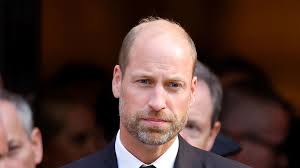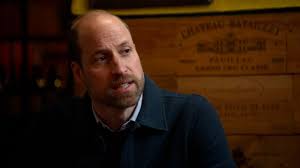Last year was a storm for Prince William. Not a political scandal or a royal controversy — something far more personal. It was a year that stripped back the layers of duty, titles, and tradition, and tested him in ways no one, not even the heir to the British throne, could have expected. In 2024, within just a few weeks of each other, both his wife, Princess Kate Middleton, and his father, King Charles III, were diagnosed with cancer. The two people closest to him — his partner in life and his monarch — were suddenly fighting parallel battles for their health.
It was in a surprisingly casual setting, over a quiet chat with actor Eugene Levy for the Apple TV+ series The Reluctant Traveler, that Prince William opened up about how hard that year was. Sitting across from Levy, in an episode set to air in the show’s third season, William shared something deeply human. “I’d say 2024 was the hardest year I’ve ever had,” he said. “You know, life is sent to test us as well, and being able to overcome that is what makes us who we are.” There was no royal statement, no palace press release — just a man reflecting on a time when everything he knew seemed fragile.
The gravity of what happened can’t be overstated. In March 2024, the world learned that Princess Kate had been quietly undergoing major surgery. It was only later that she made a public announcement revealing that doctors had discovered an unspecified form of cancer during post-operative tests. She would need to begin chemotherapy. The news landed like a shockwave. It wasn’t just the idea that a young, vibrant royal — someone so often seen smiling at public engagements, interacting with children, and championing mental health — could be dealing with something so serious. It was the reality that it had been hidden for so long, that even the most public people still deserve their private struggles.
Just a few weeks earlier, King Charles had gone public with his own diagnosis. He had undergone a procedure to treat an enlarged prostate, a routine treatment by royal standards, only for follow-up tests to reveal a form of cancer as well. Like his daughter-in-law, the King chose not to disclose the specific type of cancer, opting instead for a dignified statement acknowledging that treatment was underway and that he would be stepping back from some public duties to focus on his health.
For William, the convergence of these two events meant that the structure of his world shifted dramatically. On one side, his wife — the mother of his three children, his partner in both royal life and private moments — was now facing a grueling medical journey. On the other, his father — the figurehead of the monarchy and a constant presence throughout his life — was suddenly vulnerable in a way he had never been before. The emotional weight of supporting both must have been immense, and yet the Prince of Wales had no option but to carry on. Appearances had to be made. Duties had to be fulfilled. The public had to see stability, even when the family behind the scenes was navigating uncertainty and fear.
What makes William’s remarks in The Reluctant Traveler so powerful is the sense of normalcy in them. He didn’t try to package his experience in diplomatic language. He didn’t offer a stoic, royal-approved summary. He just said the truth — that it was the hardest year he had ever faced. That it tested him. And that getting through it was a process of growth and resilience. There’s something deeply moving about hearing those words from someone whose life, to the outside world, often seems carefully curated and impenetrably composed.
Throughout the episode, we get glimpses of the Prince not just as a future King, but as a man, a son, a husband, and a father. He takes Levy on a brief tour of Windsor Castle, joking that “we provide this service for everyone,” adding a lighthearted touch to the royal setting. There’s laughter. There’s humanity. He speaks casually about how important sleep is, especially with three young children in the house. It’s the kind of comment that any parent could relate to. He’s tired. He’s juggling a thousand things. He’s trying to be everything to everyone — just like many others around the world, albeit on a much more scrutinized stage.
Eugene Levy, who is best known for his roles in comedic series like Schitt’s Creek and films like American Pie, remarked on how down-to-earth William seemed. In a separate interview, Levy shared that the Prince had even seen American Pie with friends, laughing that it was “interesting and yet not surprising.” Levy went on to say that William struck him as “just a regular guy” — a sentiment that seems to resonate even more strongly now, knowing what William was dealing with at the time. Regular guy or not, few people have to shoulder the dual weight of family crisis and national expectation at the same time.
Kate’s diagnosis came as a blow to the public. She had been out of the spotlight for several weeks, with only vague updates given about her recovery. When she finally spoke, via a recorded video message, her tone was measured but emotional. She explained that the diagnosis had come as a surprise, that she and William had taken time to process it privately, and that she was undergoing chemotherapy. She also made it clear that their children — Prince George, Princess Charlotte, and Prince Louis — were their top priority, and that they were trying to handle the news in a way that felt safe and secure for them.

King Charles, for his part, has maintained a quiet but firm public presence during his treatment. He resumed some royal duties over time, offering a message of continuity even as he faced his own health battle. But it’s clear from William’s reflections that the experience left a lasting mark. When someone who has been a constant in your life — not just a parent, but a monarch, a symbol — shows signs of physical fragility, it reframes everything. Mortality, legacy, responsibility — they all feel closer, more urgent.
What emerges most clearly from this period in William’s life is the central role that family plays in grounding him. His words about Kate and his father are full of admiration. He doesn’t describe them as victims but as strong individuals who have faced incredible adversity with courage and grace. Kate’s quiet resolve, her decision to speak publicly only when the time felt right, and her focus on her children are testaments to her character. Charles’s measured return to public life, without drama or spectacle, signals his enduring commitment to the role he has spent a lifetime preparing for.
For William, the experience has likely reshaped his view of leadership. It’s no longer just about public ceremonies or constitutional duties. It’s about being there — present, vulnerable, honest — in times of crisis. It’s about holding a family together while being watched by millions. It’s about letting people see the cracks without falling apart.
This kind of openness isn’t typical for the royal family. Traditionally, the institution thrives on discretion. Emotions are managed quietly. Illnesses are disclosed only when absolutely necessary. Public statements are carefully worded. So when William shares that he’s had the hardest year of his life, it’s not just a personal confession — it’s a small but significant cultural shift. It signals a more human monarchy, one that doesn’t pretend to be immune to life’s toughest challenges.
The path forward for William and his family is, thankfully, looking more hopeful. Kate’s chemotherapy has ended, and while recovery continues, reports suggest she is doing well. King Charles has resumed many of his duties and appears to be managing his treatment with strength. The public, too, has responded with compassion and support. There has been a noticeable shift in tone from media coverage — a softness, an understanding that these figures, though royal, are still people at the core.
But recovery isn’t just about physical health. It’s about rebuilding a sense of normalcy after trauma. For William, that means returning to royal duties while making sure his children still get the love and attention they need. It means supporting Kate through her healing while also preparing for a future where he will one day lead the monarchy. It means finding strength in vulnerability, and courage in honesty.
In many ways, the Prince of Wales is already stepping into that future. Not just because of his title, but because of the way he is choosing to lead — with empathy, with authenticity, and with a willingness to share the parts of life that hurt. The hardest year of his life didn’t break him. It revealed him.

And for the public, that glimpse behind the royal curtain may be more important than any official appearance or speech. It tells people that even in the most privileged, prestigious families, life happens. Illness happens. Fear happens. And through it all, love remains the constant — the one thing that binds even kings and queens to the rest of us.










